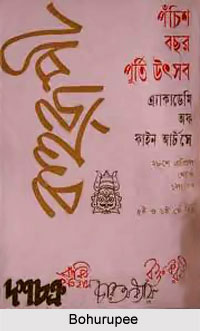 Bohurupee, a premier theatre group of West Bengal, created in 1948 by several active members who left the Indian People`s Theatre Association (IPTA). With Monoranjan Bhattacharya as guide-philosopher and Sombhu Mitra as inspiring teacher, the still-unnamed group revived Bijon Bhattacharya`s Nabanna i.e. New Harvest` in 1948 and staged Tulsi Lahiri`s Pathik or `Wayfarer` in 1949. It attracted many young people who later became well-known theatre personalities of West Bengal. Some of the names can be mentioned as Khaled Choudhury, Tapas Sen, Tripti Mitra and Kumar Roy.
Bohurupee, a premier theatre group of West Bengal, created in 1948 by several active members who left the Indian People`s Theatre Association (IPTA). With Monoranjan Bhattacharya as guide-philosopher and Sombhu Mitra as inspiring teacher, the still-unnamed group revived Bijon Bhattacharya`s Nabanna i.e. New Harvest` in 1948 and staged Tulsi Lahiri`s Pathik or `Wayfarer` in 1949. It attracted many young people who later became well-known theatre personalities of West Bengal. Some of the names can be mentioned as Khaled Choudhury, Tapas Sen, Tripti Mitra and Kumar Roy.
Formation of Bohurupee
The group named itself Bohurupee in 1950 and formed a tentative organizational framework. After a few productions Bohurupee was generally acknowledged as the leading group of the `new drama movement` that rejuvenated Bengali theatre. It was distinctive in conception and presentation of plays, behind which laid intense study and thought, long hours of disciplined practice and preparation, adherence to the idea of viewing a production as a collective endeavour and integrated artistic creation, and above all loyalty to theatre on theatre`s own terms. Backing it was Sombhu Mitra`s meticulous and painstaking direction in all aspects and Monoranjan Bhattacharya`s wisdom. They trained a host of actors and actresses, and had the cooperation of all working as a team.
Production of Bohurupee
Bohurupee produced Char Adhyay i.e. "Four Chapters" in 1951. It was dramatized from Rabindranath Tagore`s novel, which was a rare theatrical experience. It reached a high-water mark with Tagore`s masterpiece Raktakarabi or Red Oleander in 1954, giving the classic a shape of haunting beauty that influenced viewers across India. Other Tagore presentations included Dakghar or "The Post Office" in 1957, Muktadhara in 1959, Bisarjan or "Immersion" in 1961, Raja in 1964, Ghare Baire or `Home and Abroad` in 1974, and Malini in 1986. Its repertoire reveals a wide variety. Original drama and translations or adaptations of foreign plays are equally balanced. Besides Tagore, Bohurupee had a penchant for premiering Badal Sircar`s works, among them Baki itihas i.e. "Remaining History" in 1967, Pralap i.e. "Delirium" in 1967, guest directed by Sircar, Tringsha shatabdi i.e. "Thirtieth Century" in 1969, and Pagla Ghora i.e. "Mad Horse" in 1971.
Crisis in Bohurupee
The group suffered its share of dissensions, internal differences, and crises. Many members departed at different times, some died. Sombhu Mitra and Tripti Mitra themselves left, separately. So did their gifted daughter, Saonli Mitra, later. But Bohurupee weathered these setbacks in a rare instance of theatrical durability, with its reputation intact. It continues to regularly produce new plays, at present under the able stewardship of Kumar Roy, one of the earliest members.




